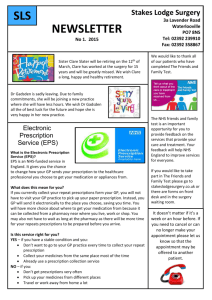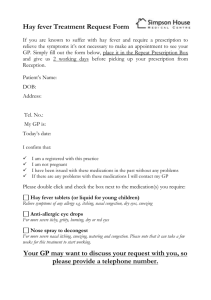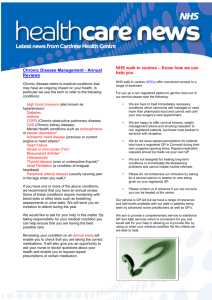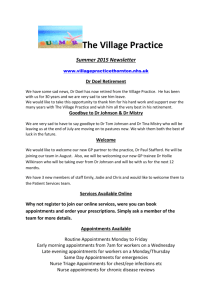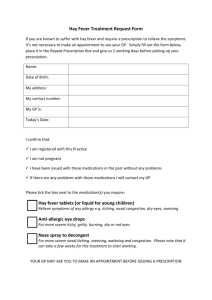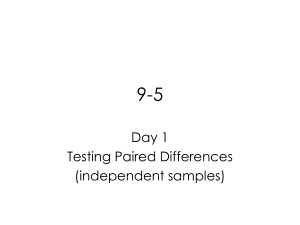Spring & Summer 2015 Newsletter Rosehall Medical Practice
advertisement
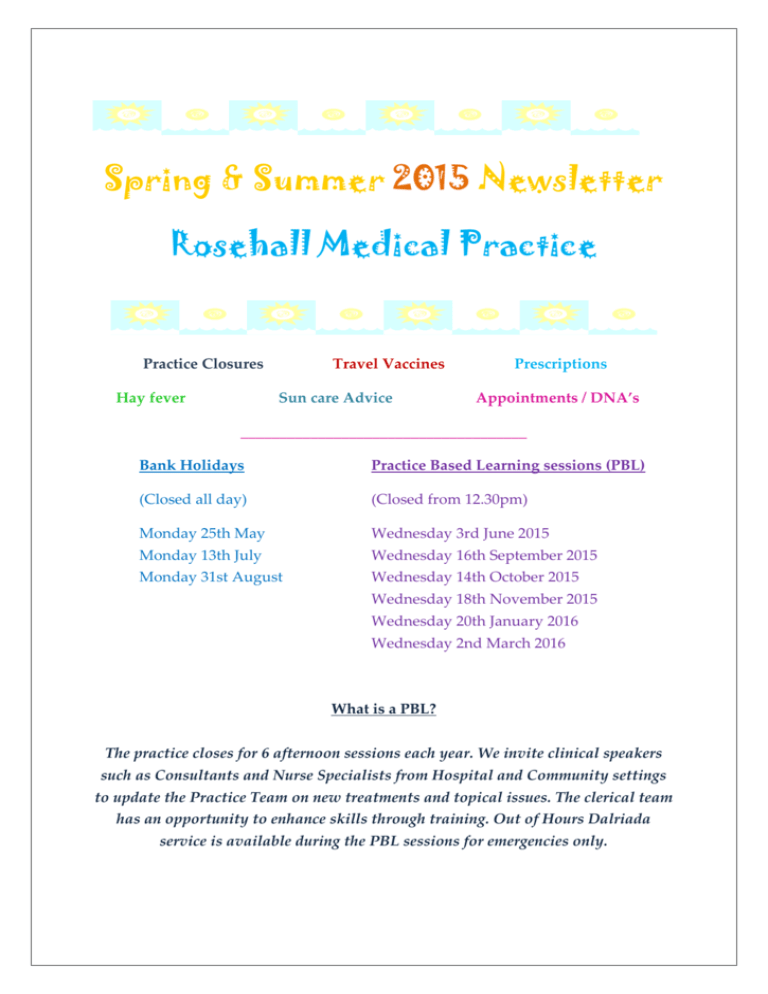
Spring & Summer 2015 Newsletter Rosehall Medical Practice Practice Closures Hay fever Travel Vaccines Sun care Advice Prescriptions Appointments / DNA’s _____________________________________ Bank Holidays Practice Based Learning sessions (PBL) (Closed all day) (Closed from 12.30pm) Monday 25th May Wednesday 3rd June 2015 Monday 13th July Wednesday 16th September 2015 Monday 31st August Wednesday 14th October 2015 Wednesday 18th November 2015 Wednesday 20th January 2016 Wednesday 2nd March 2016 What is a PBL? The practice closes for 6 afternoon sessions each year. We invite clinical speakers such as Consultants and Nurse Specialists from Hospital and Community settings to update the Practice Team on new treatments and topical issues. The clerical team has an opportunity to enhance skills through training. Out of Hours Dalriada service is available during the PBL sessions for emergencies only. Appointments Top Tips o Book an appointment that best suits your needs e.g. can I wait to see my GP for an on-going condition or do I need to be seen urgently? Our Nurse Practitioner has Same Day available appointments mon-thurs and can prescribe majority of medications. o It may be upsetting if your GP is running late but it means they are spending extra time with someone who needs it and this may be you one day. The amount of time you have available with the GP won’t be affected by the delay. o Try to avoid a ‘list’ of ailments where possible. Appointment slots last 10 minutes and your GP won’t be able to give the much needed time to cover everything. Consider making another appointment to come back and discuss the less urgent ailments. o Wear suitable clothing. Many consultations will require examination and don’t be afraid to ask for a chaperone if needed. o Make sure you discuss any important issues at the start of the consultation that way you and the GP will have amble time to investigate best options of treatment and or advice. o If you don’t understand the treatment plan your GP has discussed with you don’t be afraid to ask for further explanation. ‘Did Not Attend’ – DNA’s The number of missed appointments has been rising again. It is disappointing when patients fail to cancel appointments they can’t attend as the demand for appointments is continually growing. Below is the numbers of appointments wasted so far in 2015. January 15 = 156 February 15 = 139 March 15 = 141 April 15 = 161 Please cancel appointments giving as much notice as possible so we can offer to another patient. Appointments can be cancelled by phone, at reception or online (see site home page) Prescriptions You can order prescriptions online, in person and at reception. Please allow a full 24 hours before calling to reception to collect your prescription. If requesting a chemist collection please allows 48 hours. It is a time exhaustive process to look for individual prescriptions before the allowed time has lapsed and it means taking a receptionist away from answering calls and the reception desk Please be mindful of bank holidays & personal holidays to allow extra time as these are the busiest periods and turnaround time is strictly 24hrs for pick up and 48hrs for pharmacy to ensure you get all medications you need. Occasionally we may have to advise you the GP has not left all the medication you requested. This may mean that the GP needs to see you for a review appointment to discuss medication e.g. dose, length of treatment, appropriateness and a possible more suitable alternative. It is not intended to cause any stress, the GP has an obligation as a prescriber to carry out regular medication reviews. The surgery receives the highest number of telephone calls between 9am – 11am. If suitable it may be easier to contact us via telephone to order medication after 11am. The phone lines don’t close over the lunch period. Lines are open Monday to Friday 9.00am – 5.30pm. Phoning prescriptions to Pharmacy – This is only carried out by GP request e.g. housebound patients and those needing to start medications immediately. There is a high risk of administrative errors transferring the information by phone and is not safe practice. Prescription Facts (May 2015 data) On average we process over 700 prescription items each day – ranging from 687 to 914 & almost 300 are requests for Pharmacy collection Hayfever Hay fever, also known as seasonal allergic rhinitis, affects one in four people in the UK and is mainly caused by grass pollen Tips to relieve hay fever Avoiding exposure to pollen is the best way to reduce the allergic symptoms of hay fever: Keep windows shut at night and first thing in the morning. Stay indoors when the pollen count is high (between 50 and 150). Wear wraparound sunglasses. Put some petroleum jelly (Vaseline) or another nasal blocker just inside your nostrils to trap some of the pollen. Don't mow the grass or sit in fields or large areas of grass. Wash your hands and face regularly. Avoid exposure to other allergens, such as pet fur, or environmental irritants, such as insect sprays or tobacco smoke. Treating hay fever As with most allergies, the best way to control hay fever is to avoid the triggers. But it's difficult to avoid pollen, particularly during the summer. Even straightforward hay fever can be debilitating, causing runny eyes, sleepless nights, a bunged-up nose and headaches. A range of over-the-counter products can treat the symptoms of hay fever, including tablets, nasal sprays and eye drops. Antihistamines are the usual treatment for the main symptoms, such as itchy, watery eyes and a runny nose, while steroid nasal sprays are the main treatment for a stuffy nose. If you have particularly severe hay fever symptoms, you may need a prescription from your GP. Sun Care Advice Sunburn is skin damage caused by ultraviolet (UV) rays. It usually causes the skin to become red, sore, warm, tender and occasionally itchy for about a week It’s easy to underestimate your exposure to the sun when outside, as the redness doesn’t usually develop for several hours, and breezes and getting wet (such as going in and out of the sea) may cool your skin, so you don’t realise you’re getting burnt. You should always be aware of the risk of sunburn if you’re outside in strong sun, and look out for your skin getting hot. What to do if you're sunburnt If you or your child has sunburn, you should get out of the sun as soon as possible – head indoors or into a shady area. You can usually treat mild sunburn at home; although there are some circumstances where you should seek medical advice (see below). The following advice may help to relieve your symptoms until your skin heals: Cool the skin by sponging it with cold water or by having a cold bath or shower – applying a cold compress such as a cold flannel to the affected area may also help. Drink plenty of fluids to cool you down and prevent dehydration. Apply a water-based emollient or petroleum jelly (such as Vaseline) to keep your skin cool and moist. Take painkillers such as ibuprofen or paracetamol to relieve any pain – aspirin should not be given to children under 16. Try to avoid all sunlight, including through windows, by covering up the affected areas of skin until your skin has fully healed. You can reduce your risk of sunburn by following the advice below: Avoid exposure to sunlight when the sun is strongest – stay in the shade as much as possible, cover up with loose clothing and a hat, and use sunscreen. Apply a generous amount of sunscreen 15-30 minutes before going out in the sun and reapply at least every two hours – even water-resistant sunscreens should be reapplied after you come out of the water. When buying sunscreen, choose one that has a high sun protection factor (SPF) – sunscreen with an SPF of 50 offers the best level of protection. For further information on causes, treatments and damage caused by sunburn go to www.nhs.co.uk
